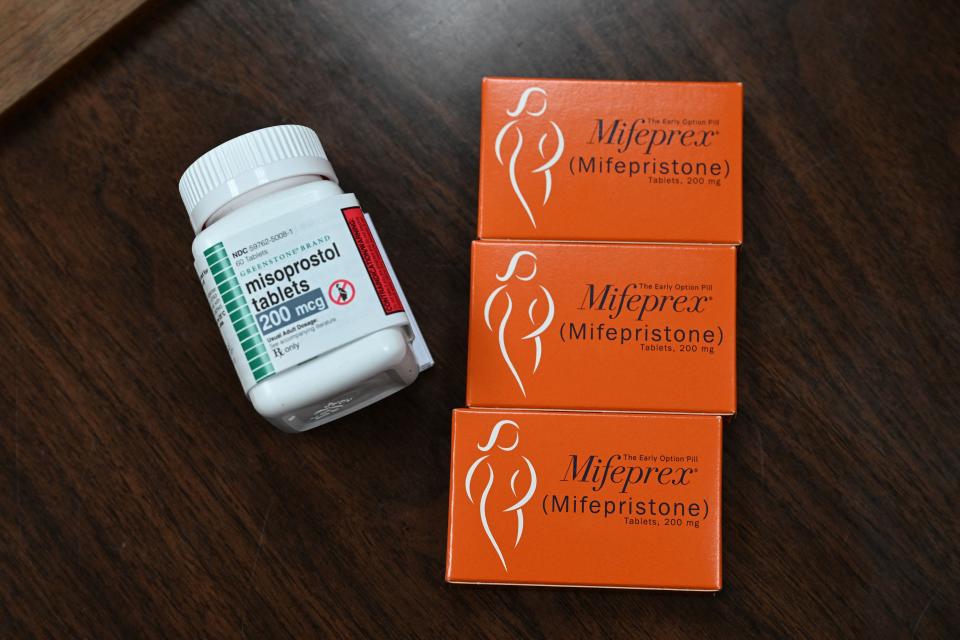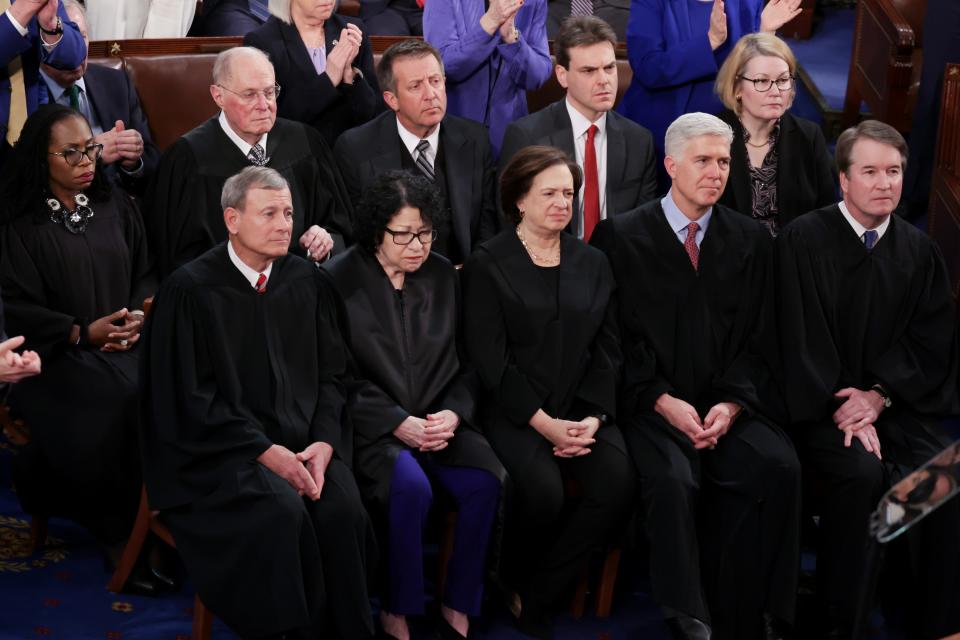SCOTUS to hear arguments about mifepristone. The impact could go far beyond abortion, experts say
- Oops!Something went wrong.Please try again later.
The U.S. Supreme Court is set to hear oral arguments Tuesday in a case experts say could significantly reduce access to the abortion pill mifepristone and have far-reaching consequences for other medications and the authority of the Food and Drug Administration.
Mifepristone is one of two drugs used for medication abortion in the United States, which has increased from 53% of all abortions in 2020 to 63% in 2023, according to data from the Guttmacher Institute. The justices agreed in December to review a federal appeals court decision to impose significant restrictions on mifepristone. The lower court ruled the FDA overstepped its authority by making it easier to obtain the drug, including allowing it to be sent by mail. The high court allowed full access to the drug to continue while the legal battle plays out.
Legal and medical experts say the upcoming ruling could pose an immediate threat to women in marginalized communities, and also could have a long-term impact on the FDA’s ability to make decisions about the safety of all drugs.
“This ruling creates a situation where any medicine - it's mifepristone today, it could be any medicine or vaccine tomorrow - can be subject to the same kind of scientifically unsound rulings that this particular medicine has been subjected to in the last several months to years,” Amanda Banks, a physician and hospitalist at the U.S Department of Veterans Affairs, said during a news briefing.

How did this case get to the Supreme Court?
In November 2022, conservative legal advocacy organization Alliance Defending Freedom filed a federal lawsuit in Texas on behalf of a coalition of organizations, including the Alliance for Hippocratic Medicine, arguing mifepristone has medical risks and should be pulled from the market.
Mifepristone is among "the most studied medications" prescribed in the United States, and evidence supporting the drug's safety and efficacy is "overwhelming," according to an amicus brief filed in support of the FDA by the American Medical Association, the American College of Obstetricians and Gynecologists, American Academy of Family Physicians and several other organizations. Experts have said mifepristone is safer than common drugs including Tylenol and Viagra.
But Erik Baptist, senior counsel for the Alliance Defending Freedom, said the FDA did not properly study the cumulative impact of the changes made to how the abortion medication is prescribed. The lawsuit, he said, is meant "to restore basic safeguards for abortion drugs that the FDA recklessly removed both in 2016 and then again in 2021."
"When Congress passes along, gives the FDA jurisdiction to be the nation's drug gatekeeper to ensure the safe use of drugs in the United States, it gave specific instructions of how to approve drugs and the changes to a drug regimen," Baptist said. "And then when FDA takes those instructions and abuses them and fails to comply with Congressional direction, it's up to the courts to hold those unlawful agencies, here the FDA, accountable for those actions."
U.S. District Judge Matthew Kacsmaryk sided with the ADF in an April ruling that effectively invalidated the FDA's 23-year-old approval of the drug. The 5th U.S. Circuit Court of Appeals, based in New Orleans, ruled in August the FDA overstepped its authority by loosening restrictions on mifepristone, but dismissed a part of the lawsuit that challenged the FDA's underlying approval of the drug.
The Biden administration appealed in September, and the Supreme Court agreed to review the decision. Though the Supreme Court decision could have immediate impacts on access to the drug, it likely won’t be the end of the legal battle over mifepristone, according to Julia Kaye, senior staff attorney at the American Civil Liberties Union.
“It is very likely that this decision by the Supreme Court that we're expecting in June, will not be the end of the road and that this case will return to the trial court for further proceedings with the guidance of whatever the Supreme Court decides in June,” Kaye said.

Ruling could mean 'losing access altogether' for some patients
If the Supreme Court allows the lower court’s order to take effect, patients would no longer be able to obtain mifepristone through the mail after a telehealth appointment, Kaye said. The number of abortions provided by virtual telehealth clinics increased by 137% between April 2022 and December 2022, according to a recent report from the Society of Family Planning. Roe v. Wade was overturned in June 2022.
Instead, patients would be required to pick up their prescriptions in person at a hospital, clinic or medical office, which Kaye said could add additional burdens including paying for transportation, making childcare arrangements, taking time off of work or escaping the surveillance of an abusive partner.
“For some patients, particularly low-income patients, people of color, folks living in rural areas and women with abusive partners, losing a telehealth option for mifepristone means losing access altogether,” she said.
Reinstating this requirement would also have a profound effect on women in the military, who may be stationed in states or countries where they are unable to access abortion care in person and unable to take time off to travel, according to Louis Caldera, former Secretary of the Army and director of the White House Military Office. Caldera told reporters these restrictions could have a major impact on national security as the military is already facing a “severe recruiting crisis.”
“These are barriers we do not need to put in front of our women service members,” Caldera said. “When we put those kinds of barriers, it makes it harder to recruit, it makes it harder to retain, it makes it harder to keep and promote the very people we've invested in, who we need in the senior ranks.”
Randall K. O'Bannon, director of education and research at National Right to Life, raised concerns about how women in remote areas who can only obtain mifepristone through the mail would receive medical care if they suffered complications. Studies show major adverse reactions to mifepristone are "exceedingly rare," occurring in about 0.3% of cases, according to the American Medical Association.
"The better thing is for them to forego abortion altogether and to get the sort of prenatal care and help that they need," he said.
Restrictions would increase burden on health care providers
Major retail chains Walgreens and CVS recently announced they would offer mifepristone, but Kaye said this ruling could effectively prohibit them from distributing the drug, forcing health care providers to act as both prescriber and pharmacist. She said this would not only increase wait times at clinics that are already overburdened, but would add “enormous bureaucratic hurdles” that could cause some prescribers to stop offering the medication altogether.
While the in-person dispensing requirement is the most burdensome, the court also could impose other restrictions on when providers can prescribe the drug, including reducing the gestational limit for prescribing the medication from 10 weeks to seven, according to Ushma Upadhyay, a professor and public health scientist at University of California San Francisco. The ruling could also reverse a decision the FDA made in 2016 to reduce the number of times a doctor must see a patient before prescribing the medication from three to one, Upadhyay said during a call with reporters.
“Some providers in states like California and more protective abortion supportive states may provide the medications off-label, they may continue providing it as they always have been,” she said. “But providers in a state like Ohio, which actually has a state law that requires providers to follow the FDA label, they will have to go back down to the outdated protocol."
Baptist, of the Alliance Defending Freedom, said multiple doctor visits can help identify serious complications before and after taking the drug and determine exactly how far along a person is in their pregnancy, which he said is important because the likelihood of complications increases with time. The World Health Organization has said the combination of mifepristone and misoprostol can be taken at home without the direct supervision of a health care provider up to 12 weeks of gestation.
Supreme Court could ‘undermine the authority of the FDA’
Dr. Gwen Nichols, Leukemia and Lymphoma Society chief medical officer, told USA TODAY if restrictions on mifepristone were reinstated, it would “undermine the authority of the FDA” and allow people without expertise in science or medicine to question the administration based on personal beliefs. Nichols said she’s concerned the Supreme Court ruling could similarly threaten cancer drug treatments that lack alternatives, which could lead to patient deaths.
The society said in a January Supreme Court brief supporting the FDA the administration has been trusted to expand access to drugs following real-world and clinical trial data. One of them is Keytruda, originally approved for melanoma, which the administration expanded to include more than 20 different cancers.
Nichols said the ruling could make pharmaceutical companies like Merck, which developed Keytruda, less likely to conduct clinical studies following approvals.
“We think that could impact patients that we serve,” she said. “These are life-saving drugs. These are life-and-death decisions.”
Baptist said the ruling "should not impact any other drug in the marketplace or in the pipeline because FDA's actions are so out of the norm here."
Uncertainty on the safety of drugs developed in the U.S. can harm patients worldwide, according to Banks, a health care industry strategist and managing director Banks Advisory. The World Intellectual Property Organization, an intellectual property service organization within the United Nations, ranked the U.S. third in the world for its 2023 Global Innovation Index report (Switzerland and Sweden take first and second), and said the nation has the "world's biggest drug market."
Banks said the case has already created confusion among pharmaceutical companies, investors and scientists and further confusion caused by the high court’s ruling could upend the drug approval process.
“It could put innovation for new drugs and therapies for much, much needed, badly needed therapies for patients, not just in the United States but globally at fundamental risk,” she said.
Contributing: John Fritze, Jeanine Santucci, Karen Weintraub and Christine Fernando, USA TODAY
This article originally appeared on USA TODAY: SCOTUS mifepristone case could harm FDA, medication abortion, experts warn

